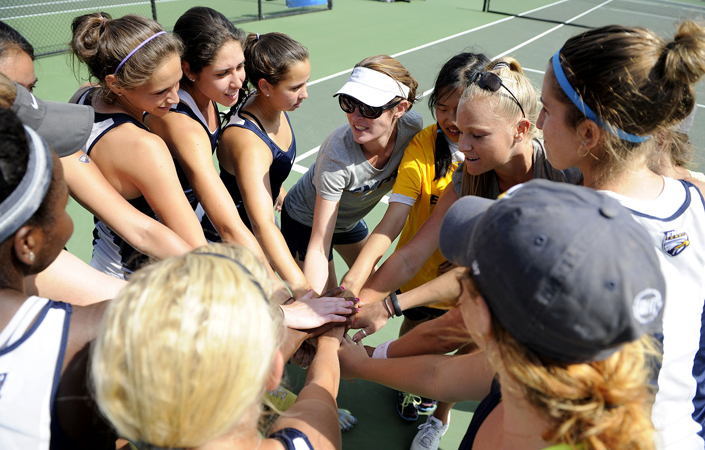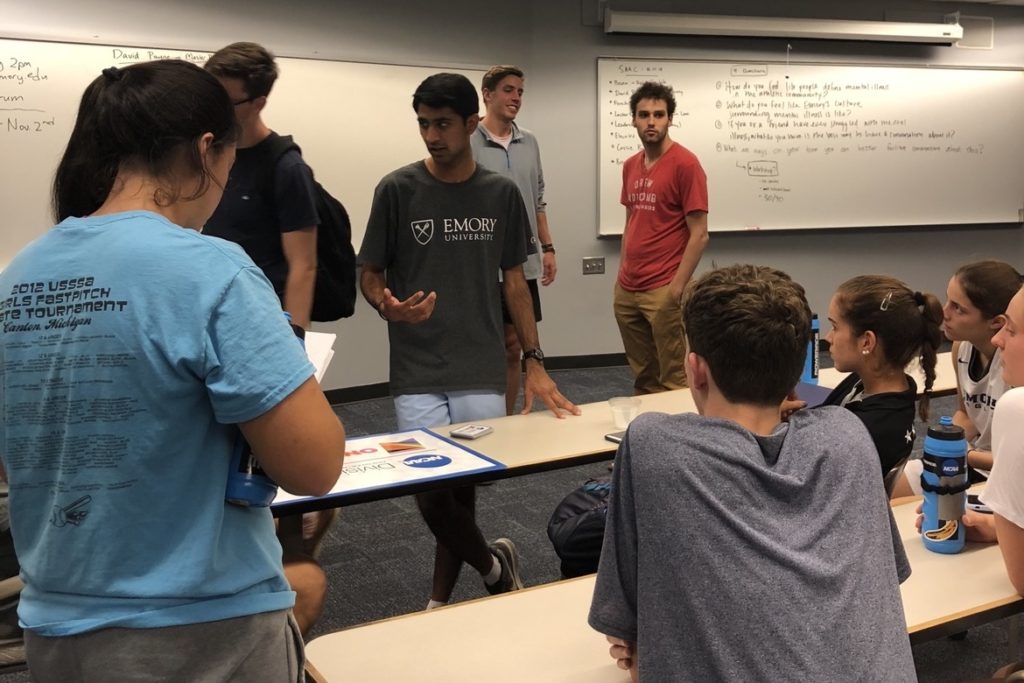
Like many other athletic departments, we recently created a new tagline at Emory University to denote achievement: FLY HIGHER. It taps into our eagle mascot and our long history of being a top NCAA Division III program.
But beyond the catchy wording, its meaning goes a lot deeper. Two years ago, Emory athletics committed to fostering a culture of integrity through a series of new programs. We have always strived to promote ethics through athletics, but we wanted to take it to a higher level. We hoped to redefine success as something intrinsically linked to character.
New Tagline in College Athletics Department Highlights Integrity
Our teams have captured 25 national titles and 194 University Athletic Association (UAA) team championships. Close to 1,000 of our athletes have been named All-Americans and 114 have become NCAA Postgraduate Scholars. But we realized none of that means anything unless we consistently uphold ethical standards.
With the aim to FLY HIGHER, we began a series of discussions, trainings, and promotions. The programs have been collaborative, and they reach both coaches and student-athletes. We weren’t sure, at the start, how they would be received, but before long we realized they were having a significant impact in many ways.
Teams are changing their initiation practices of their own accord. Coaches are guiding their student-athletes in a more thoughtful way. And everyone affiliated with Emory athletics has begun discussing difficult issues instead of shying away from them. Student-athletes and staff are learning to pause for ethical reflection and to practice principled action.
Catalysts for Implementation of College Athletics Integrity Initiative
Throughout 2014 and 2015, there were a rash of media reports uncovering negative activities in college athletics, including at our peer institutions. Across different sports and campuses, teams were found to engage in misogynistic and racist behavior, often as part of bonding traditions. Hazing incidents continued to be uncovered, despite upgraded efforts to erase them.
Then in 2016, during his campaign, President Donald Trump used “locker room talk” as an excuse for his comments about sexually harassing women. As a coach at Emory for nearly 20 years, and a student-athlete before that, my first reaction was that “locker room talk” at our school sounds starkly different than what he described. Others in the athletic department had similar thoughts, which prompted discussion.
My colleagues and I wondered: What if some of our athletes do engage in demeaning, racist, homophobic, or threatening discussion? How would we know? How can we make sure it never happens? Do we need to educate our athletes about the power of their words? Can we make our culture one that creates constructive conversations?
At the time, the university was implementing the Emory Integrity Project, thanks to a grant from the Templeton Foundation, and it seemed a natural progression for athletics to design a complementary program. The university-wide project “articulates integrity as a synthesis of three essential components, referred to as the 3-H model—honor, humility, and helpfulness.” It then attaches a commitment to each word:
Honor: truthfulness
Humility: an awareness that one can be mistaken and therefore needs a relative openness to correction and learning
Helpfulness: integrity, as a virtue, demands action.
The humility component of the 3-H structure resonated strongly with me and others in the athletic department. We all know about coaches who have gotten away with abusing their athletes because they were winning—until a video or enough complaints surface and then there is a shameful and very public firing. But one article about such an incident rocked me more than others because of what the coach said afterwards. He claimed he truly cared about his players and he was just coaching the best way he knew how.
It led me to think about my position as a veteran coach, and about some of my peers. If we are left unchallenged about our work for a long time, how would we even come to the recognition that we should be doing things differently? How would we know we were doing anything wrong?
Continuing education for coaches varies by institution with no governing body setting protocol at the national level. And there’s little incentive to modify what we do when we continue to win games.
We wanted to change that at Emory. We wanted to push ourselves to never feel complacent about our integrity. We wanted to fill the coaching ethics curriculum void. And we wanted our student-athletes to be right alongside us in the process.
Initially I brought this idea to the table, and the initiative moved forward with several coaches and administrators working together, including Athletic Director Mike Vienna, Associate Athletic Director Joyce Jaleel, and Elizabeth Cox, the Liaison from Campus Life to the Emory Integrity Project. The end goal was to keep integrity at the forefront of all Emory teams and for a reflective learning process to permeate everything we do.
“Locker Room Talks” Hallmark of College Athletics Integrity Initiative
A hallmark of the integrity initiative is a discussion forum called “Locker Room Talks,” with the name being a positive reclamation of the term. They occur during every head coaches meeting, with a minimum of 10 minutes allotted for them. The topics are diverse but always relatable, and we often use examples from peer institutions and current events.

To start, we chose a mild topic for our first forum and I led the discussion. I offered a fictitious basketball scenario in which a foul is called and the coach sees that the referees are confused about who actually was fouled. The coach sends his best free throw shooter to the line even though he knows that a different player (a poor free throw shooter) was fouled.
There was a lot of discussion about what is a coach’s responsibility compared to a referee’s responsibility. Many coaches acknowledged that situations where the cheating line is blurred happen all the time across all sports. In swimming, there is an opportunity to take an extra kick in the breaststroke. In soccer, there’s flopping. In tennis, there are score mix-ups. The discussion was robust. In the end, it was clear that the expectation at Emory is that we (coaches and student-athletes) should always act with the utmost integrity.
After I led a few more Locker Room Talks, other coaches brought issues to the table and led discussions. Along with having one coach presenting, it was important to have a mediator, and our athletic director usually fills this role.
I can’t say that Locker Room Talks were an immediate, across-the-board success. It took a little while to get everyone to embrace them. The time demands on coaches are high—nobody wants to make a meeting any longer than it already is, especially when the minutes spent don’t tally results in the win column. And some discussions have gotten heated, particularly when coaches feel like they are being targeted by the subject matter and have to defend their team.
But by the time we started the second year of our initiative, most coaches began to see the value of the talks and they have become a welcome part of our coaches meetings. Everyone truly does want to act with honor, and we’ve come to realize that humility is an essential piece of becoming better coaches. (Keeping the discussions to a time limit has helped, too!)
Our Head Women’s Volleyball Coach, Jenny McDowell, told me, “Locker Room Talks encourage us to talk about the red flags raised in our minds. Our conversations are not always comfortable, but in the end, we all learn something new.”
Most of the time, our topics are inspired by media reports regarding a situation at a peer institution. Sometimes, they require studying federal, state, and university equity and inclusion policies. Often, they result in coaches collaborating on best practices for managing complex team situations.
Hot Topics for Discussion in College Athletics Department Integrity Initiative
Here are some topics we’ve tackled:
– Peer institution teams that have been found to have sexually explicit scouting reports or participate in racist, sexist, and homophobic messaging on social media.
– Issues in sexual orientation, focusing on Michael Sam’s experience
– The debate over paying collegiate student-athletes
– Colin Kaepernick and activism in athletics
– Transgender student-athletes and performance legitimacy, with discussion on Harvard transgender swimmer Schuyler Bailar
– Social media team policies
– Mental health at Emory and in athletics, and how to promote a culture of acceptance
– Creating an inclusive environment per the NCAA “One Team” campaign
– Winning coaches being “untouchable,” even at the D-III level
– The place of religion in college athletics and access to our student-athletes for religious groups.
For me, one of the most difficult discussions was about social media and owning what you post. Some believe that young people are going to “say what they say” and we should teach our student-athletes to be very careful about what they place on social media—to make sure nothing is offensive and shines a negative light on our institution. I argued the opposite line. We should be teaching our athletes about the harmful effects of derogatory or hateful comments in any situation and thus convince them of the importance of never doing so, even privately. Then, there is no need to censor themselves regarding what they put online.
In several meetings, the topics have led us to learning more about our legal responsibilities as coaches, especially with regards to Title IX and reporting allegations of sexual assault. A big eye-opener was understanding that it is no longer acceptable for a coach or administrator to claim they didn’t know something negative was occurring. It is our duty to know.
We’ve also come to better understand our university’s polices. For example, when we discussed Colin Kaepernick and collegiate athletes kneeling during the national anthem, we learned that Emory has a policy permitting student-athletes to speak and stand up for their beliefs. As long as it doesn’t negatively impact the regular operations of the university, we can’t tell them not to protest. Open expression is superseded only by life, safety, and interrupting university events.
Student-Athlete Committee Discusses Hot Topics
Along with coaches discussing ethics and integrity, we wanted our student-athletes to do the same. Therefore, Locker Room Talks also occur at Student Athlete Advisory Committee (SAAC) meetings. Many student-athletes now point to these discussions as their favorite part of the meetings.

“All of us have enjoyed Locker Room Talks because leaders of our 18 varsity sports have an opportunity to sit together and plan ways to improve our teams’ cultures and the overall experience of being an Emory athlete,” says Anna Fur, who served as President of the SAAC last year. Other SAAC members have said that the talks “create open-mindedness” and allow student-athletes to “see where other people are coming from.”
Our SAAC meetings happen monthly, with 15-20 minutes for Locker Room Talks, led by a different member each time. The discussion leader selects a topic and works with Audrey Hester, Assistant Director of Athletics for Student-Athlete Success and Compliance and one of the SAAC advisors, to develop prompts. Student-athletes are sometimes asked to read an article or case study beforehand about the issue and then think about how it applies to their experience at Emory.
SAAC Locker Room Talks have covered a variety of topics thus far, including mental health, diversity and inclusion, hazing, sportsmanship, esports, interpersonal violence prevention, misogynistic vernacular, social media usage, and transgender teammates. Student-athletes discuss how to best support their peers as well as methods of ethical leadership and decision-making.
One particularly important discussion was about Larry Nassar and his sexual assault of athletes as a team doctor. Everyone was shocked at how far the abuse was able to go, and studying the event helped our student-athletes understand the support available here if they find themselves in a similar situation.
SAAC members were moved by reading Kevin Love’s article in The Players’ Tribune, “Everyone is Going Through Something,” and discussed ways to better support teammates and encourage each other to access campus resources for mental health. The discussion prompted a baseball player to organize a mental health workshop for his team with Emory’s Counseling and Psychological Services.
Leadership Education is Essential for College Athletics Programs Fostering a Culture of Integrity
Leadership education for student-athletes is another essential element of the integrity initiative. Our program is called Eagles Rising, which entails a series of workshops specific to class years. Student-athletes are offered tools so they have the capacity to regulate their own behavior when they are away from the watchful eyes of coaches and fans. Sessions focus on teaching student-athletes how to successfully navigate difficult situations, such as holding teammates accountable for their actions.
In the fall semester, freshmen are given guidance on building connections within the Emory community and transitioning to college, sophomores focus on their individual leadership strengths, juniors work on using their strengths to positively influence and motivate their teammates, and seniors learn how to translate their leadership skills to life after Emory. In the spring, all class years come together for a workshop centered on strategies for communicating across differences.
The common thread that now runs through the workshops is ethical leadership, ensuring all student-athletes have the tools and training to meet any situation they may face with integrity. We work hard to make the learning meaningful to student-athletes’ specific experiences—and we’ve found it important to include free food!
“We want to empower and educate our student-athletes so they have the moral courage to stand up for what’s right on and off the field, in classrooms and social settings,” explains Hester.
Rewarding Results of a College Athletics Department’s Integrity Initiative
After two years, the integrity initiative has proven to be successful and worthwhile for both coaches and student-athletes. One of the most visible results is that teams are scrutinizing their traditions and customs to root out denigration and disrespect. Leaders are changing their perspective on the appropriateness of team initiations and many squads have adjusted or abolished established team rituals altogether.
In addition, our athletes are now adept at identifying when something could be construed as hazing, even when the actions seem harmless. For example, freshmen on one of our teams used to wear signs on game day to advertise when and where the contest was. It seemed like a harmless tradition and the student-athletes said they wanted to do it. Now, student-athletes of all years stop by a sports promotion table to help sports marketing staff distribute flyers to promote their events.

My fellow coaches have come to embrace and applaud the program for reminding them of priorities in the midst of daily pressures. Jon Howell, Head Coach of our powerhouse men’s and women’s swimming and diving teams, which have captured 12 NCAA championships, sums it up nicely. “We want to guide our student-athletes to represent the university in a positive way in and out of the pool,” he says.
In my own coaching, the discussions have helped me balance the desire to win with the obligation to teach more important lessons in life. Our impact on student-athletes extends much farther than the playing field.
I also find myself being more sensitive to the needs of my student-athletes. I now continually give myself a litmus test: If I were in her shoes, how would this make me feel? And when talking with other coaches, I try to be that devil’s advocate, especially when I hear something that doesn’t sound quite right or may not meet our integrity standard.
Our athletic director has also found the initiative important for derailing any ethical crisis that might occur. “The integrity program does not make us immune to having a scandal—nothing does,” Vienna says. “But because we are now exchanging ideas about issues, our response is clearer and we can react more quickly.”
Going forward, we hope to expand the initiative so that assistant coaches and more athletic administrators are involved in Locker Room Talks. And we’d like to have every coach lead one discussion a year. We’re also hoping to have more sessions guided by experts in specific areas.
During a time when media reports frequently reveal improprieties in intercollegiate athletics, the Emory Eagles are studying those missteps and working together to proactively prevent them here. Ultimately, the goal of the integrity initiative is to create an environment that commands respect for all, where student-athletes can flourish and shape a positive culture at Emory and beyond.
Recognizing Integrity not Performance in College Athletics Programs
One more prong of the integrity initiative at Emory includes recognition. While most athletic awards focus on performance, “Elevated Eagles” are spotlighted solely for their acts of integrity. Student-athletes who engage in community support and awareness are nominated by their peers and a winner is chosen by the SAAC each month.
For example, a recent Elevated Eagle was recognized for his extensive commitment to the Team Impact program, in which a sport “adopts” a young person with a disability. Many members of this student-athlete’s own team were unaware he was the catalyst for the team’s involvement until he was honored.
Another student-athlete earned the award for having a personal motto of “pride, discipline, and respect.” Teammates felt the player’s dedication to his words helped changed the culture of the team.
Award winners are recognized through media releases and a photo of the winner with a description of their act(s) of integrity is displayed in the athletics building. All the Elevated Eagles are then honored at our end-of-year athletics banquet. Along with celebrating the student-athlete, this keeps integrity in the forefront of people’s minds.
Three “musts” for Successful Implementation of an Integrity Program in College Athletics Departments
Based on our experience in implementing a program for ethical reflection at Emory athletics, I believe there are three things that must be present to have success:
Support: Administrative buy-in and support are critical. The athletic director must be firm in his or her commitment to making integrity always come first in all decision-making.
Openness: The staff and student-athletes must have a growth/learning mindset. Coaches need to know that their job responsibilities include continual reflection and education. And all meetings must be seen as safe spaces to share ideas.
Compelling meetings: Discussions have to be meaningful and relevant, with good presenters who prepare probing questions. Experts should be available for certain topics. Preparation is key.
Amy Bryant has been Head Women’s Tennis Coach at Emory University since 2000. Her teams have won six NCAA Division III titles, with 13 appearances in the team championship finals. She has coached individual players to win eleven NCAA titles. She was a member of the NCAA Tennis Committee from 2004 to 2007, serving as chair in 2007, and was on the Faculty Advisory Committee for Emory’s Integrity Project.





